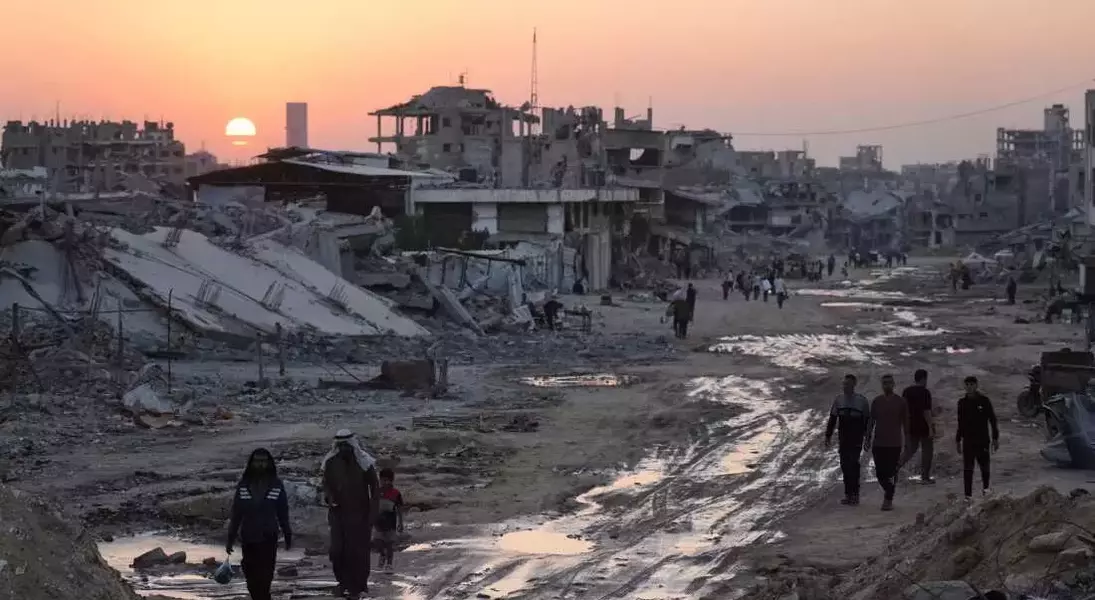
In a significant development amidst the ongoing, delicate ceasefire, Israel has confirmed the reception of the remains of three individuals previously held hostage in Gaza. These remains are currently undergoing forensic analysis to ascertain their identities, a process critical for bringing closure to the affected families. This event unfolds as a tenuous, month-long cessation of hostilities persists in the region, highlighting the complex and sensitive nature of the peace efforts. The return of these remains is a crucial, albeit somber, step in the broader efforts to account for all those affected by the recent conflict, signaling both progress in negotiations and the profound human cost of the hostilities.
The Israeli government's announcement on Sunday marked a poignant moment in the volatile landscape of the Middle East. The remains, transferred from Gaza, are now subject to rigorous forensic examination, a necessary step before official identification can be communicated to their families. Earlier reports from Hamas indicated that these remains were discovered within a tunnel system located in the southern part of Gaza, underscoring the clandestine and perilous circumstances surrounding their detention. Since the ceasefire's inception on October 10, Palestinian militant groups have progressively released the remains of several hostages. Before this latest handover, seventeen sets of remains had been returned, with eleven individuals still unaccounted for in Gaza. The Israeli military has committed to informing the families directly and discreetly once definitive identifications are made, recognizing the immense emotional toll this process exacts.
Adding a deeply personal dimension to this tragic narrative, U.S. President Donald Trump later confirmed that Omer Neutra, an American-Israeli citizen, was among the three individuals whose remains were returned. President Trump conveyed that he had personally communicated with Neutra's parents, expressing the complex emotions they faced upon receiving this news. Neutra, a native of Long Island, New York, had served as a tank platoon commander in the Israel Defense Forces. Israeli authorities had previously believed Neutra perished during the October 7, 2023, attack led by Hamas on southern Israel, an event that ultimately ignited the protracted conflict. The President recounted the parents' mixed feelings, describing them as "thrilled, in one sense, but in another sense, obviously, it's not too great," reflecting the bittersweet nature of finding closure under such heartbreaking circumstances.
The process of exchanging remains has been fraught with challenges. Militant groups have been returning one or two bodies intermittently, leading Israel to press for a more expedited process. In some instances, Israel has contested the identity of the remains provided, claiming they did not belong to any of the hostages. Conversely, Hamas has cited the extensive destruction across Gaza as a significant impediment to locating and identifying additional remains. The emotional intensity surrounding these returns is palpable among the families, who continue to hold weekly vigils, advocating for their loved ones. Moran Harari, a friend of the late Carmel Gat, publicly urged restraint from Israel during a recent rally in Jerusalem, lamenting the devastating loss of life on both sides and advocating against further escalation. In a reciprocal gesture, Israel has been releasing the remains of fifteen Palestinians for every Israeli hostage's remains returned.
The identification process poses considerable difficulties for health officials in Gaza, particularly due to the lack of access to essential DNA kits. According to Gaza's Health Ministry, which maintains detailed records considered reliable by independent experts, only 75 of the 225 Palestinian bodies returned since the ceasefire commenced have been successfully identified. The ministry has resorted to posting photographs of unidentified remains in the hope that families might recognize their relatives. This exchange mechanism forms a cornerstone of the initial phase of the U.S.-brokered ceasefire, a comprehensive 20-point plan that also includes provisions for establishing an international stabilization force. This force, comprising Arab and other partners, is envisioned to collaborate with Egypt and Jordan to secure Gaza's borders and ensure adherence to the ceasefire. While several nations have expressed interest in participating in such a peacekeeping mission, they have stipulated the requirement of a clear mandate from the U.N. Security Council before committing troops. Beyond these immediate concerns, more profound questions persist regarding the disarmament of Hamas, the future governance of a post-conflict Gaza, and the modalities for significantly increasing humanitarian aid to the embattled region.
Israeli Prime Minister Benjamin Netanyahu acknowledged on Sunday that "there are still pockets of Hamas" within areas of Gaza currently under Israeli control. Speaking at a Cabinet meeting, Netanyahu specifically identified two such areas, Rafah and Khan Younis, vowing that these remaining strongholds "will be eliminated." This ongoing conflict, the most devastating in the history between Israel and Hamas, originated from the Hamas-led assault in 2023, which resulted in approximately 1,200 fatalities and the capture of 251 hostages. Israel's subsequent military operations have led to the deaths of over 68,800 Palestinians in Gaza, as reported by Gaza's Health Ministry. The ministry, part of the Hamas-administered government and staffed by medical professionals, does not differentiate between civilian and combatant casualties. Israel, while refuting allegations of genocide made by a U.N. commission of inquiry and other entities, has consistently disputed the ministry's figures without providing an alternative, verifiable count. The retrieval of these remains underscores the continuing human tragedy and the intricate challenges inherent in establishing lasting peace and accountability in the region.
